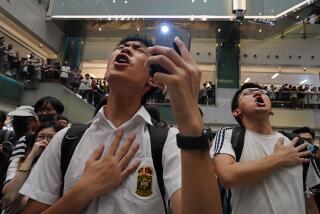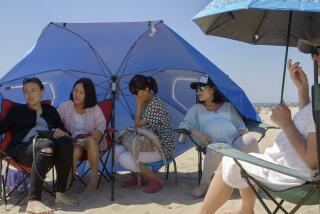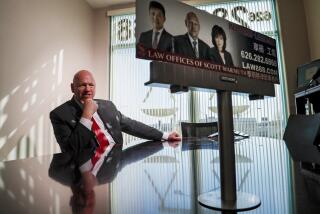Name-calling feud escalates between Hong Kong and mainland China
- Share via
Reporting from Hong Kong and Beijing —
At first glance, the newspaper ad depicting an enormous locust looking over the Hong Kong skyline seems like a plug for a horror movie.
In fact, it’s the latest slap in the face to the millions of mainland Chinese tourists who flood Hong Kong each year, bringing with them what many in the territory see as less-than-refined social habits in addition to their bulging wallets.
Mainland tourists stand accused of littering, spitting, urinating in public, smoking cigarettes in inappropriate places and other breaches of etiquette that offend the more fastidious sensibilities of many Hong Kong natives.
Echoing anti-immigration sentiments often heard in the United States, some in Hong Kong also complain of mainland women giving birth in Hong Kong, an action that guarantees the newborns the right of permanent residency.
The ad, published Wednesday in the Apple Daily tabloid by a group calling itself the Golden Forum, claimed that 1 million Hong Kong dollars ($129,000) was being spent every 18 minutes on a mainland mother giving birth in a Hong Kong public hospital.
Officials have already responded to such criticism by reducing the number of foreigners allowed to give birth in Hong Kong hospitals. The quota is now 3,400, down from 10,000 in 2011.
On Wednesday, Cheung Wai-lun, a senior official at Hong Kong’s Hospital Authority, said in a radio interview that the territory’s hospitals may stop admitting “non-local pregnant women” next year.
“We are trying to safeguard local pregnant women’s rights to publicly funded medical services and facilities,” Cheung said.
Such moves are drawing strong reactions from the mainland, which has ruled Hong Kong since 1997 but has granted it a high degree of political autonomy.
The derogatory advertisement provoked outrage in mainland China, with many commentators on Sina Weibo, the equivalent of Twitter, lambasting Hong Kong residents as colonial snobs.
One infuriated mainlander called for economic sanctions against Hong Kong. “Cut off their water, power and food supplies! Let’s see who is finished first!” he wrote on Sina Weibo.
The Communist Party newspaper Global Times weighed in Thursday with a more measured editorial calling for efforts by both sides to build “a shared sense of identity.”
Since the British ceded control of the territory to Beijing nearly 15 years ago, tourism from the mainland has skyrocketed. More than 27 million mainland tourists visited Hong Kong last year, triple the territory’s own population and up 16.5% from the previous year, according to the Hong Kong Tourism Board.
Christine Loh, the director of the Hong Kong-based think tank Civic Exchange, said many Hong Kong residents are afraid that the territory may be overwhelmed by the 1.4-billion-person country.
“When there is a greater force looming, it is natural for people to want to assert their own identity as a way to not feel overwhelmed,” she said in an email interview.
Michael DeGoyer, a professor at Hong Kong Baptist University, believes many resent the mainland’s growing wealth. DeGoyer recalled that when he first moved to Hong Kong in 1988, the subway to the border was packed with Hong Kong residents taking appliances to their poorer mainland relatives. Now, he said, it is full of mainlanders taking luxury items home.
“On the train with them there are Hong Kong people who have seen their relatives’ wealth advantage disappear since 1997,” he said. “So instead of looking down on mainlanders with pity and disdain, they’re being looked down on with pity and disdain by mainlanders.”
Despite their common heritage, many in Hong Kong view mainlanders as less socially cultured and politically refined. Having been ruled by the British for 156 years, Hong Kong is still teeming with signs of its colonial past, from English street names to an unrestricted press and independent courts. One vestige of colonial rule in particular — a prim attitude about public manners — has been a common source of disputes between locals and mainland visitors.
“We just naturally see each other as two different kinds of people,” said Ellen Wang, a 24-year-old financial editor in Hong Kong who grew up on the mainland.
Last month, public feuding broke out when an Internet video showing a spat between a local man and a mainland woman in the Hong Kong subway went viral. The Hong Kong man had upbraided the woman for allowing her child to eat on the train, and the woman refused to apologize.
“No need to speak to them; that’s what mainlanders are like,” muttered another Hong Kong man on the video.
In reaction, a mainland professor, Kong Qingdong, unleashed a long tirade on a Web-based talk show, calling Hong Kong residents “thieves” and “running dogs in front of colonialism.” Shortly afterward, about 150 Hong Kong residents hit the streets chanting, “Apologize!” in front of a Communist Party liaison office. Many brought their dogs.
Also in January, 1,500 Hong Kong women stood in a pouring rain outside a maternity clinic calling for the government to stem the tide of “double negatives,” their term for children whose parents are both mainlanders. Another anti-mainland demonstration is scheduled for Feb. 12 to protest plans to allow motorists from neighboring Guangdong province to drive their cars into Hong Kong.
Last year, an Internet music video called “Locust World” enumerated Hong Kong natives’ complaints in the form of a saccharine Cantonese pop song. Against a black-and-white video of swarms of locusts devouring a field, the singer painted a portrait of mainland tourists spitting in public, yelling into cellphones and allowing their children to defecate on the streets.
“The locusts will stop at nothing,” he croons. “Inch by inch, Hong Kong is being taken over by these pests.”
For some mainlanders, the best response is to keep shopping.
Li Yanying, 26, a human resources manager from Beijing who recently was standing outside a Hermes outlet in Hong Kong, said she was unconcerned about differences between mainlanders and Hong Kong residents.
“When I come to Hong Kong, it’s usually just to buy things,” she said. “The only Hong Kong people I really talk to are cab drivers and tour guides.”
Special correspondent Kaiman reported from Hong Kong and Times staff writer Demick from Beijing. Tommy Yang of The Times’ Beijing bureau contributed to this report.
More to Read
Sign up for Essential California
The most important California stories and recommendations in your inbox every morning.
You may occasionally receive promotional content from the Los Angeles Times.










